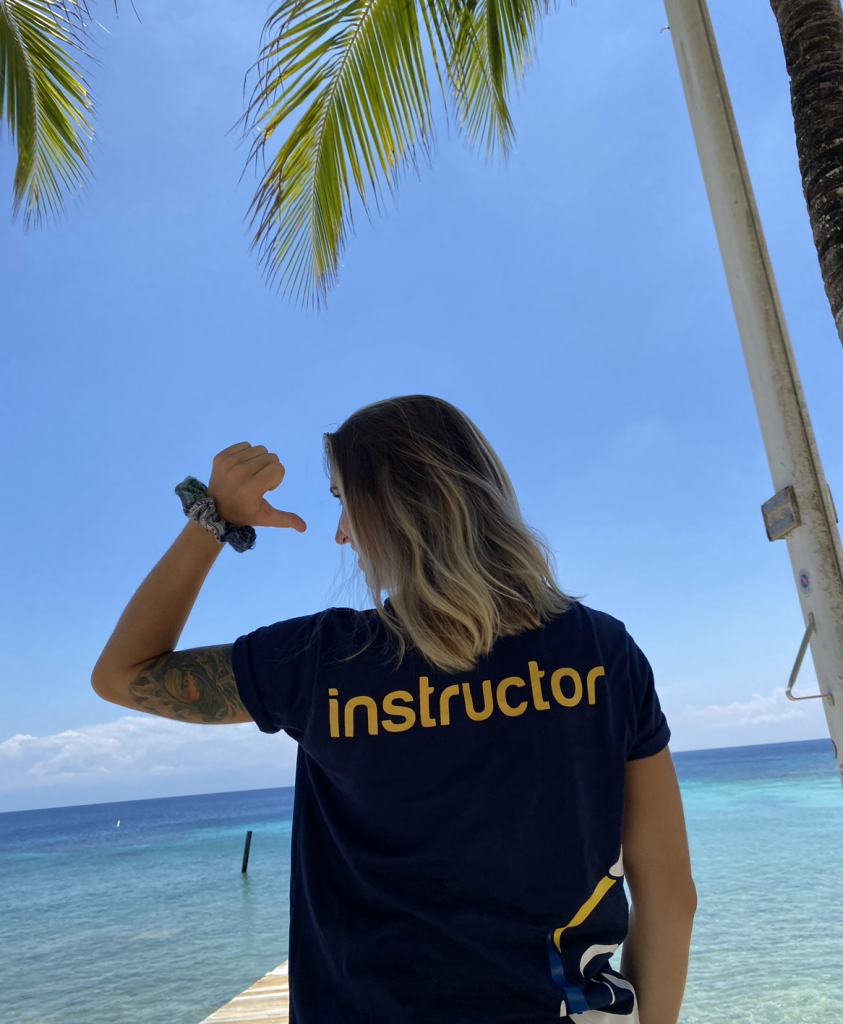What did you accomplish with your host organization? What was the impact of your work?
During my time with the Whale Shark and Oceanic Research Center (WSORC), I developed an understanding of the fragile relationship between many of the organisms living on and around the coral reefs of Utila. After learning to identify and understand these organisms, as well as important natural features for coastal protection such as mangroves, I was able to assist in teaching conservation interns both in the classroom and underwater. Throughout the month the interns were here, I could see their understanding and passion for marine stewardship grow and it was incredibly rewarding.
In addition to teaching, I had a personal research project. I spent the first month or so of my internship working on developing and refining surveys and conducting background research on fishery policies of the protected area surrounding the island. At the beginning of August, my research partner and I were able to start conducting surveys on local fishermen. Unfortunately, there were several changes in access and time availability and we had to put our research project on hold. I was quite sad about this, but we quickly refocused our efforts on a project on understanding the invasive lionfish population surrounding the island. Since WSORC conducts biweekly lionfish hunts followed by dissections for data collection, we already have quite a lot of data and are well on our way to analyzing this data to deepen our understanding of this invasive species and how its population may be distributed as well as the reproductive maturity and other factors of the fish. This information can be used by the organization to strategize the most effective containment efforts and to further understand the impacts of lionfish in Utila.

Describe the benefits of this experience for you professionally and personally?
My experience with the Whaleshark and Oceanic Research Center exceeded all of my expectations. The way our classroom lessons were blended with first-hand learning and application through identification and survey dives; collecting real data to be used for international databases on biodiversity, fish distribution, coral health, and more; and the level of outreach and integration into the community are several of the ways WSORC impacted me most. I arrived quite passionate about protecting marine life, but after a summer here I have an even deeper level of appreciation for the underwater world. I’ve had the opportunity to network with professionals from a multitude of different countries and fields of profession. Most importantly, I was introduced to a way of teaching and a branch of outdoor education and conservation education that I didn’t know existed in this way.
Did your experience provide any unexpected discovery, self-reflection, or epiphany?
My experience this past summer led to a lot of personal reflection and caused me to think about what I want to prioritize for my future. Backtracking, there were several key moments in my life where I found myself at a crossroads and I had to choose between furthering my diving career or pursuing a more traditional education. I was quite torn on this choice both before starting my undergraduate degree and before starting my master’s at MIIS. I still knew I wanted to become a scuba professional, but I always thought it would involve me taking a summer or 6 months off between “career positions” to become a dive instructor and achieve this personal goal and then move on, with diving as a hobby I would always love. I remember staying after class(virtually) with Dr. Jason Scorse (Director of the Center for the Blue Economy) after his environmental economics class my first week at MIIS and asking him if there was any way to combine diving with our field, or how I could set myself up to do fieldwork as much as possible without a natural science background. It turns out that my answer to this question would be the CBE fellowship. After spending several months diving more days than not, and not only diving but diving for a purpose and applying the data we collected to understand the marine protected area and its effectiveness as well as species distributions; to not only research invasive lionfish but remove them from the reef and studying them with my own eyes, I knew that this was exactly the kind of work I hope to start my career by doing. After a lot of reflection, I’ve determined that I want to do whatever it takes to work in marine conservation programs with a diving component where I can share my passion for the underwater world to the fullest extent.

Because our courses at MIIS are a mix of in-person, online, and blended this semester, I was able to work with my professors to stay on track for graduation but continue living in Honduras. This is allowing me to further my diving education and continue working on my research project. Thanks to support and flexibility from MIIS; the amazing staff I worked with at WSORC, Andrea and María; and my diving mentors at the Bay Islands College of Diving, especially Stephen; I am now a PADI specialty instructor. I’m living in a dream setting and situation for the semester and eagerly applying to positions that I would not have qualified for in May.


